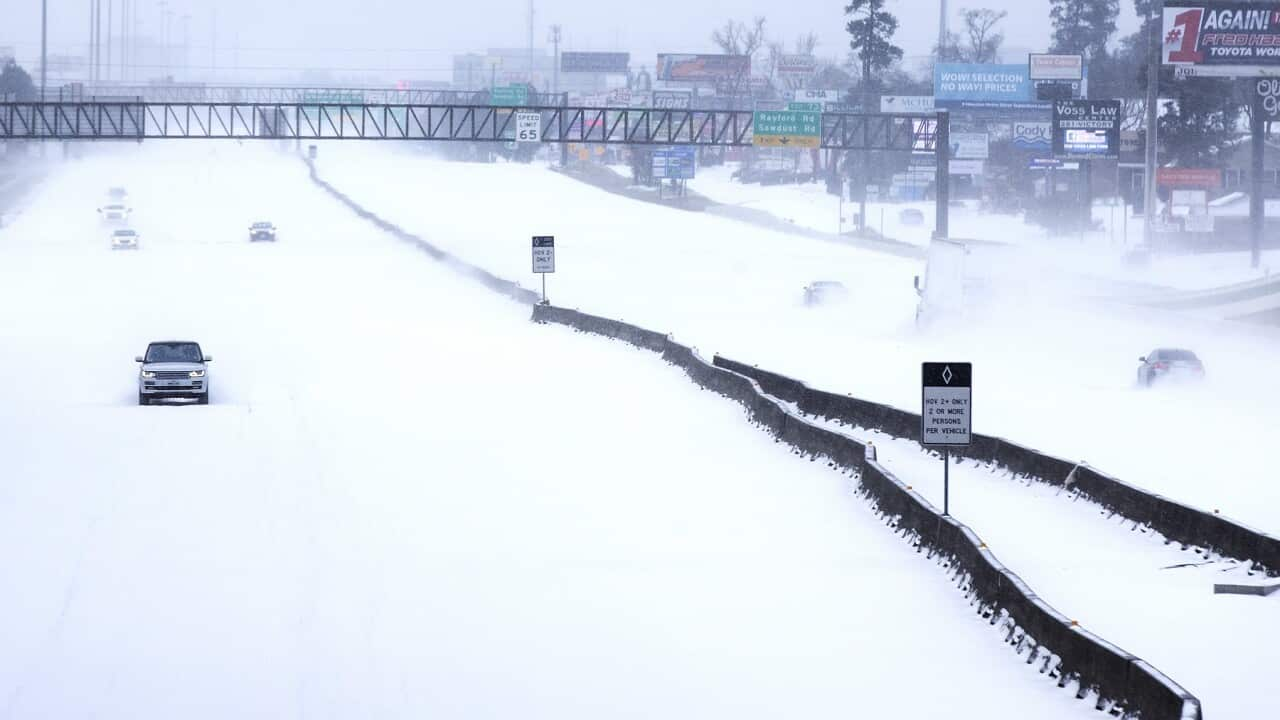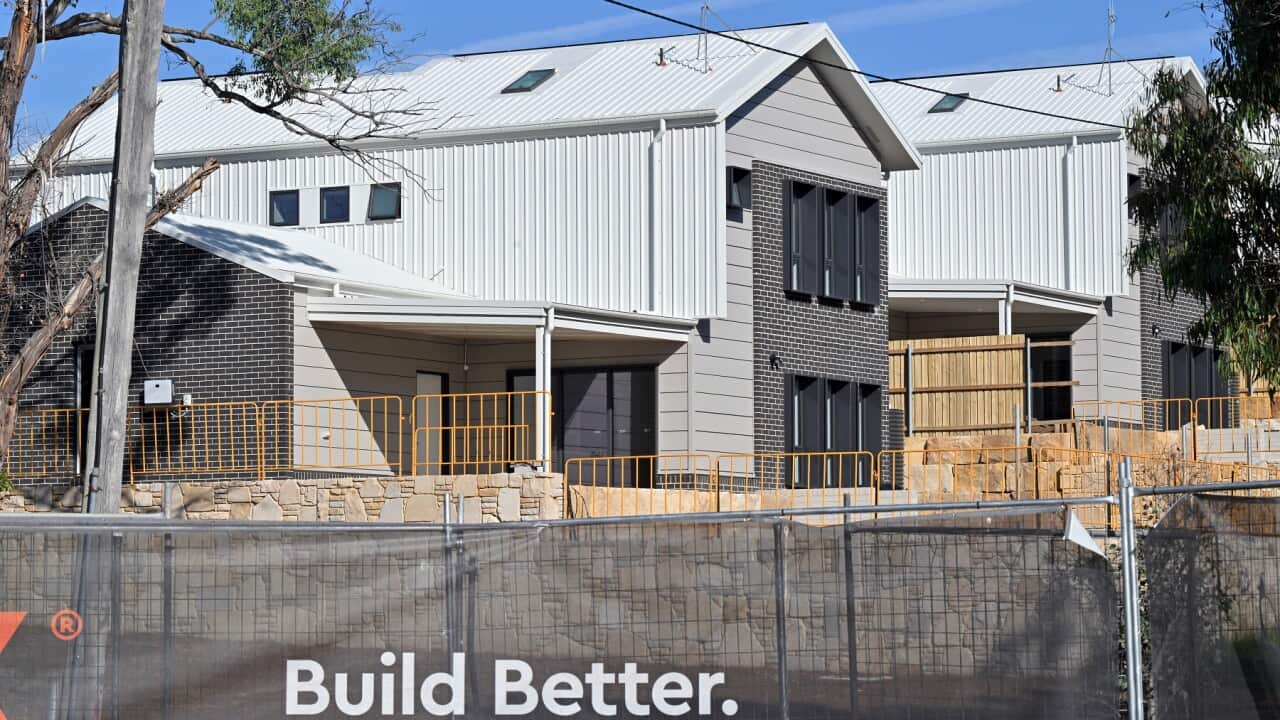Italian
ANCHOR: "Texas has been especially hard hit - millions there are without power, water or heat, amid some of the coldest temperatures in over 100 years. Our Marcus Moore is on the roads in Dallas - Marcus, what are you seeing there?"
MOORE: "Hey Diane we've been driving around this afternoon we are in just outside downtown Dallas in the Deep Ellum district if you're familiar with this part of Texas and you can see here the roads covered with with snow."
Quando ad inizio anno delle pericolose tempeste invernali si sono abbattute sul Texas, milioni di persone si sono ritrovate senza riscaldamento e energia.
Con il clima estremo sono arrivate una serie di affermazioni estremamente virali sul cambiamento climatico e l’energia verde.
Dopo poco tempo, la gente online ha iniziato ad affermare che a causare il disastro fosse stato il fallimento dell’energia eolica.
Queste affermazioni non si avvicinavano neanche lontanamente alla vera situazione.
Alcuni impianti eolici si ruppero, ma la causa principale dei blackout in Texas fu la mancanza di gas naturale.
Questo non ha fermato le voci di corridoio e ciò che è successo in Texas è stato solo una parte di uno schema che d’allora si è diffuso.
Mentre le prove sul cambiamento climatico si sono accumulate l’una sull’altra, le tattiche di chi si oppone all’azione climatica sono cambiate.
Jenny King fa parte del think tank dell’Institute for Strategic Dialogue.
"The vast majority of content that exists on social media sits in more grey zone space, where it might not actively deny the reality of climate change. But it cherry picks scientific data, tries to discredit and attack those involved in institutions or climate experts, and ultimately misleads the public around the viability of certain solutions going forward."
King e il suo gruppo hanno organizzato quello che chiamano il Consiglio di Guerra della COP 26.
Prendono in esame le conversazioni online sul cambiamento climatico.
Dall’inizio dell’anno hanno tracciato 130mila tweet e post di Facebook che affermano che le energie rinnovabili come solare e eolico siano pericolosamente inaffidabili.
"This is a narrative which really serves to the benefit of those who are trying to preserve the status quo. And the idea is that if you weaken the public's trust or their understanding of these renewable technologies, you make sure that the energy grid stays in these traditional industries."
E l’ISD ha notato altre tattiche create per compromettere l’azione climatica, come l’accusa che allontanarsi dai combustibili fossili renderà le persone indigenti ancora più povere.
È stato chiesto per questo rapporto a Facebook, Twitter e al proprietario di YouTube Google che cosa stessero facendo per la disinformazione sul clima.
Tutti hanno risposto di stare prendendo sul serio la situazione e di avere delle politiche in atto per limitare la sua diffusione.
Ma molti che si trovano a combattere la disinformazione sul cambiamento climatico ritengono che non stiano facendo abbastanza e alcuni accusano inoltre le grandi compagnie petrolifere di essere responsabili della diffusione della disinformazione.
Parlando ad un’udienza alla camera dei deputati americana ad ottobre, la presidente del Comitato di Vigilanza Carolyn Maloney ha accusato compagnie come ExxonMobil di stare mentendo al pubblico.
“Big Oil has known the truth about climate change for decades. In the 1970s and 80s, Exxon's own scientist privately told top executives that burning fossil fuel was changing the global climate. Exxon and other big oil companies had the opportunity to tell the truth and lead the way to find alternative energy sources. But instead, Big Oil doubled down on fossil fuels. The industry ran a coordinated campaign to mislead the public, hide the dangers of its own product and derail global efforts to reduce greenhouse emissions."
Il presidente di ExxonMobil Darren Woods ha dichiarato durante l’udienza che la sua compagnia da molto tempo ha ammesso la realtà ed i rischi del cambiamento climatico e ha investito risorse significative per rispondere a questi rischi.
Ha aggiunto che le dichiarazioni pubbliche del gigante del petrolio sul clima sono sempre state oneste, basate sui fatti e conformi alla scienza sul clima corrente.
Ma l’affermazione è stata messa in dubbio dalla presidente Maloney, che ha trasmesso un video registrato dall’ex lobbista della Exxon Kevin McCoy, che venne per questo subito licenziato.
"Did we aggressively fight against some of the science? Yes. Did we hide our science? Absolutely not. Did we did join some of these shadow groups to work against some of the early efforts? Yes, that's true. But there's nothing illegal about that. You know, we were looking out for our investments."
Mentre il mondo sembra concentrarsi sull’abbassamento delle emissioni di anidride carbonica, l’American Petroleum Institute, il più grande gruppo di lobby dell’industria, sottolinea che il mondo consuma 100 milioni di barili di petrolio al giorno, e che questa è una quantità che non sembra probabile possa diminuire a breve.
English
ANCHOR: "Texas has been especially hard hit - millions there are without power, water or heat, amid some of the coldest temperatures in over 100 years. Our Marcus Moore is on the roads in Dallas - Marcus, what are you seeing there?"
MOORE: "Hey Diane we've been driving around this afternoon we are in just outside downtown Dallas in the Deep Ellum district if you're familiar with this part of Texas and you can see here the roads covered with with snow. "
When deadly winter storms hit Texas earlier this year, millions found themselves without heat and power.
Along with the extreme weather came an extremely viral set of claims about climate change and green energy.
Soon, people online were claiming that the failure of wind power caused the disaster.
It was nowhere near the full picture.
Some wind turbines did fail.
But the main cause of the Texas blackouts was natural gas shortages.
That didn't stop the rumour mill, and what happened in Texas was just one part of a pattern that spread ever since.
As the evidence about climate change has stacked up, the tactics of those opposed to climate action have shifted.
Jenny King is from the think tank, the Institute for Strategic Dialogue.
"The vast majority of content that exists on social media sits in more grey zone space, where it might not actively deny the reality of climate change. But it cherry picks scientific data, tries to discredit and attack those involved in institutions or climate experts, and ultimately misleads the public around the viability of certain solutions going forward."
Ms King and her team set up what they refer to as a COP 26 War Room.
They monitored climate change conversations online.
Since the start of the year, they've tracked 130,000 tweets and Facebook posts, claiming that renewable energies like solar and wind power are dangerously unreliable.
"This is a narrative which really serves to the benefit of those who are trying to preserve the status quo. And the idea is that if you weaken the public's trust or their understanding of these renewable technologies, you make sure that the energy grid stays in these traditional industries."
And the ISD has seen other tactics designed to undermine climate action, like claims that moving away from fossil fuels will make poor people poorer.
Facebook, Twitter and YouTube owners Google were asked for this report about what they are doing about climate misinformation.
All said they take it seriously and have policies in place to limit its spread.
But many of those fighting climate change misinformation say they're not doing nearly enough - and some claim big oil companies are responsible for spreading misinformation.
Speaking at a US House of Representatives hearing in October, House Oversight Committee chairwoman Carolyn Maloney accused companies like ExxonMobil of lying to the public.
“Big Oil has known the truth about climate change for decades. In the 1970s and 80s, Exxon's own scientist privately told top executives that burning fossil fuel was changing the global climate. Exxon and other big oil companies had the opportunity to tell the truth and lead the way to find alternative energy sources. But instead, Big Oil doubled down on fossil fuels. The industry ran a coordinated campaign to mislead the public, hide the dangers of its own product and derail global efforts to reduce greenhouse emissions."
ExxonMobil CEO Darren Woods told the hearing that his company has long acknowledged the reality and risks of climate change and has devoted significant resources to addressing those risks.
He said the oil giant’s public statements on climate had always been truthful, fact-based and consistent with mainstream climate science.
But the claim was challenged by Chairwoman Maloney, who played a video recorded by former Exxon lobbyist Kevin McCoy, who was subsequently sacked.
"Did we aggressively fight against some of the science? Yes. Did we hide our science? Absolutely not. Did we did we join some of these shadow groups to work against some of the early efforts? Yes, that's true. But there's nothing illegal about that. You know, we were looking out for our investments."
While the world may be focusing on lowering carbon emissions, the American Petroleum Institute, the oil industry’s top lobbying group, points out that the world consumes 100 million barrels of oil per day — and that's an amount that seems unlikely to decrease any time soon.
Report by the BBC's Kayleen Devlin and Allan Lee




